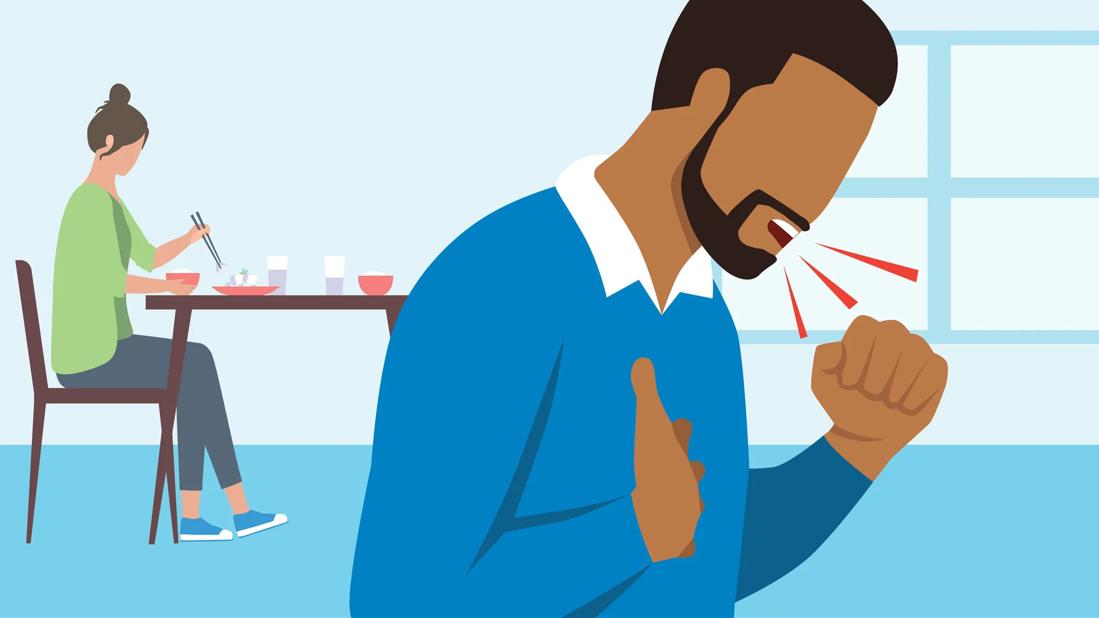When something like food or drink goes down your windpipe rather than your esophagus, it can cause coughing and sometimes choking

Image content: This image is available to view online.
View image online (https://assets.clevelandclinic.org/transform/63ab24c7-2624-400b-8771-18d63aeafd19/man-coughing-eating-at-table-2150779936)
Man steps away from eating at the table to cough with hand on sternum, with partner continuing eating at the table
We’ve all been there: One moment, you’re eating lunch, when out of nowhere, a coughing fit strikes. It soon passes, giving you some relief, but … what the heck just happened?!
Advertisement
Cleveland Clinic is a non-profit academic medical center. Advertising on our site helps support our mission. We do not endorse non-Cleveland Clinic products or services. Policy
When something “goes down the wrong pipe,” it means it’s been sucked into your breathing tube instead of the tube that helps you swallow food. But what exactly is going on, and why?
What’s going on is called aspiration, which is when anything that isn’t air gets into your airways, like something you eat or drink.
Normally, the muscles in your lower throat propel food and drink into your esophagus, the muscular tube that carries it down to your stomach. But when something goes “down the wrong pipe,” it’s gotten into your windpipe (trachea) instead.
Your trachea, which is part of your airway system, carries oxygen to your lungs and carbon dioxide away from them. For the most part, nothing but air should go in or out of it, so your body works hard to help keep unwanted food, drink and saliva out. It’s a task performed in concert by your throat muscles, vocal cords and epiglottis, a handy flap above your trachea.
“Like so much about our bodies, it’s an automatic process,” explains urgent care specialist Karl Elser, DO. “But sometimes, something just slips through the wrong way. It’s more likely to happen when you’re distracted, eating quickly, or if you’re talking or laughing while you eat.”
Advertisement
When you aspirate, your body’s fight-or-flight response triggers an outpouring of adrenaline, the hormone associated with preparing for dangerous situations. Your heart rate and blood pressure spike. And usually, your body can take care of things quickly — by coughing.
“A gag or cough reflex will start automatically, and this often fixes the problem,” Dr. Elser says. “It’s your body’s way of trying to expel something that doesn’t belong.” Afterward, you may need to clear your throat a few times or sip on some water to feel normal again.
But sometimes, coughing doesn’t do the trick. In this case, food remains where it shouldn’t be, like on your vocal cords, in your trachea or even in the small airways of your lungs. When this happens, you may feel:
Food or drink that aspirates into your lungs can lead to a bacterial infection called aspiration pneumonia, which requires medical treatment.
Aspiration and choking aren’t the same, but they’re closely related — namely because aspiration can cause choking.
“When you aspirate, food goes someplace it shouldn’t, but it doesn’t necessarily block your airway,” Dr. Elser explains. “Food that gets into your airway can lead to a choking sensation, but you’re still able to move air in and out of the windpipe.”
Choking — especially complete choking, when your airway is fully blocked — is a medical emergency that requires immediate first aid like the Heimlich maneuver.
“It’s important to clear your airway as soon as possible,” Dr. Elser stresses.
When food goes down the wrong pipe, the feeling can range from unpleasant to downright scary. So, how should you respond?
Dr. Elser explains that coughing is your body’s natural way of removing foreign objects from your airway. So, if a coughing fit comes on, don’t try to stop it. Just let your body do what it does.
And remember to try to stay calm. Panicking can cause you to breathe faster, which can put more pressure on your trachea.
“Aspiration is usually brief, if your body can expel that foreign material right away,” Dr. Elser says. “But if you’re still coughing two to four hours after an episode of aspiration, call a doctor.”
You should also seek immediate help if you:
If you seem to have multiple episodes of aspiration — like something is constantly going down the wrong pipe — that’s also a sign to talk to a healthcare provider.
Advertisement
“That can be a sign of another health issue, like a vocal cord disorder, a swallowing disorder, a muscle coordination problem or even a neurological disorder,” Dr. Elser points out. “It’s important to talk about it with your primary physician, who can run tests or refer you to a specialist to figure out what’s going on.”
Advertisement

Sign up for our Health Essentials emails for expert guidance on nutrition, fitness, sleep, skin care and more.
Learn more about our editorial process.
Advertisement
Changing how you breathe, gargling water and distracting yourself are all common ways to stop your diaphragm from spasming
Simple at-home solutions, like doing pursed lip breathing and drinking a warm beverage, can often bring immediate relief
Mouth taping may seem promising, but it can actually cause more harm than good, especially if you snore or have sleep apnea
If you’re feeling short of breath, sleep can be tough — propping yourself up or sleeping on your side may help
Getting vaccinated in October can help protect you against severe illness between November and March
Breathing through your nose is far better for you, but depending on your anatomy, that may not always be possible
Cut up foods into small pieces and make sure you sit down and focus during meals
One theory is brain temperature regulation, and yes, a ‘contagious yawn’ is a real thing
Although it could be used as a moisturizer, this new trend is not recommended
Communicating clear limits helps protect your time, energy and emotional well-being
High cholesterol can be genetic, but testing and treatment can lower your heart disease risk